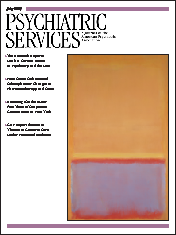Rearrest and Linkage to Mental Health Services Among Clients of the Clark County Mental Health Court Program
Abstract
OBJECTIVE: This study examined rearrest and linkage to mental health services among 368 misdemeanants with severe and persistent mental illness who were served by the Clark County Mental Health Court (MHC). This court, established in April 2000, is based on the concepts of therapeutic jurisprudence. This study addressed the following questions about the effectiveness of the Clark County MHC: Did MHC clients receive more comprehensive mental health services? Did the MHC successfully reduce recidivism? Were there any client or program characteristics associated with recidivism? METHODS: A secondary analysis of use of mental health services and jail data for the MHC clients enrolled from April 2000 through April 2003 was conducted. The authors used a 12-month pre-post comparison design to determine whether MHC participants experienced reduced rearrest rates for new offenses, reduced probation violations, and increased mental health services 12 months postenrollment in the MHC compared with 12 months preenrollment. RESULTS: The overall crime rate for MHC participants was reduced 4.0 times one year postenrollment in the MHC compared with one year preenrollment. One year postenrollment, 54 percent of participants had no arrests, and probation violations were reduced by 62 percent. The most significant factor in determining the success of MHC participants was graduation status from the MHC, with graduates 3.7 times less likely to reoffend compared with nongraduates. CONCLUSIONS: The Clark County MHC successfully reduced rearrest rates for new criminal offenses and probation violations and provided the mental health support services to stabilize mental health consumers in the community.



